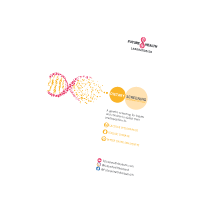
Dietary screening for babies & children
Every new parent wants a healthy future for their child and to give them the best possible start.
What is a dietary screening?
A dietary screening is an effective, non-invasive way to discover if your baby or child is at an increased genetic risk of developing lactose intolerance, coeliac disease and/or bitter taste sensitivity.
Why is the screening useful?
- Make informed choices on feeding and weening
- Identify foods to avoid if symptoms develop
- Can help to explain symptoms already present*
- Full scientific report provided*
- Scientifically robust genetic analysis
Download a brochure
*If your baby or child shows symptoms of lactose intolerance, coeliac disease or bitter taste sensitivity you must seek the advice of a healthcare professional regardless of the result of the test. Your report can be used by a healthcare professional to provide additional insight when considering your child’s medical care.
How can I do it?
The screening is available in two formats:
Cord blood storage & dietary screening

Select our Premium+ stem cell storage package

Your umbilical cord blood sample is collected after birth and sent to our lab

We'll carry out the dietary screening on a small drop of cord blood and return the results by email
Or
Dietary screening cheek swab

Order your dietary screening kit online, or through our customer care team

Carry out the simple cheek swab at home

Return the kit to us and receive your results by e-mail
This is a common problem that can develop from weaning onwards, involving the digestion of lactose found in animal milks and dairy products. People with lactose intolerance are unable to break down lactose into the sugars glucose and galactose, due to reduced production of the enzyme, lactase. This causes bacterial fermentation of lactose in the small intestine.
Coeliac disease is a widespread autoimmune condition which is caused by hypersensitive reactions to dietary gluten. Gluten is a protein found in the grains of wheat, barley, rye and spelt, and is consequently found in some of the most common foods eaten around the world.
Some individuals are highly sensitive to bitter-tasting compounds called glucosinolates, found in foods such as cabbage, broccoli, sprouts and other cruciferous vegetables. People who have this increased sensitivity are known as ‘tasters’. The presence of this trait can determine whether someone is likely to have an increased bitter taste response to certain foods than ‘non-tasters’.









